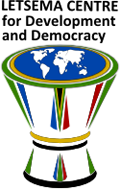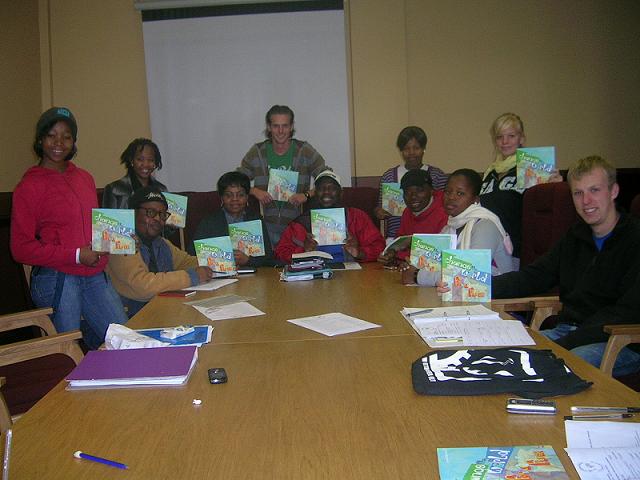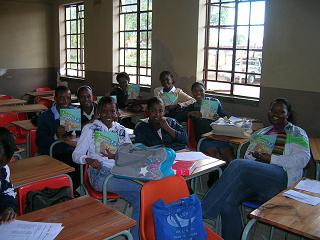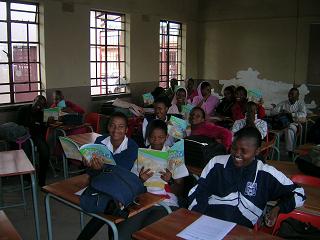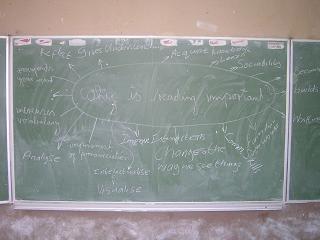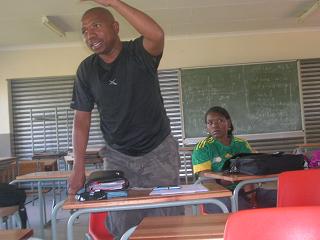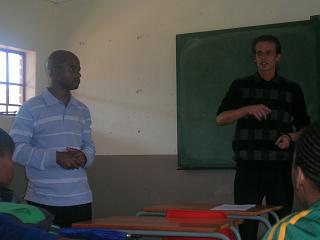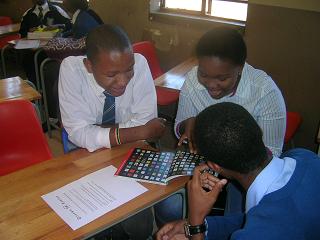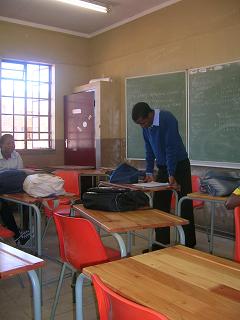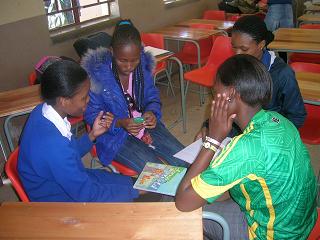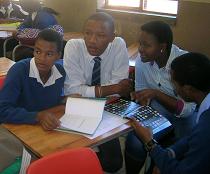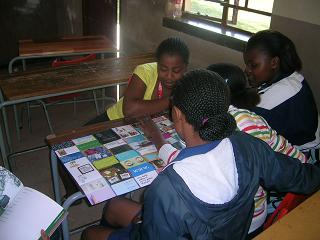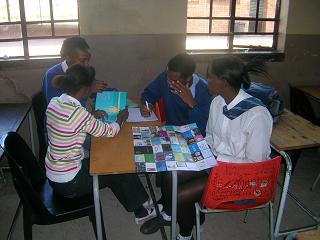We Are What We Do Learning Workshop Series
Project Name: We Are What We Do Learning Workshop Series
Placement: Ga-Rankuwa, City of Tshwane
Project Manager: Sebastian Goettel, Frans Molefe Modise
In cooperation with wearewhatwedo, www.wearewhatwedo.org
Volunteers of LETSEMA CENTRE welcome »Change the World for a Fiver« book
On April 15, 2010 we met a group of about 15 interested learners from Modiri High School in Ga-Rankuwa. The meeting was announced for this day and the learners were informed quite briefly, it is about a campaign from Britain, called »We are what we do«. We presented the book, its content and explained the background about the campaign. Everybody who was interested to be part of the workshop series wrote his/her name in a list.
On April 23, 2010 I met the previous group again, plus 15 more interested learners from the school. The participants informed their friends and our
group grew.
Finally, when everybody knew what the book is about, all of them were excited to get one. Unfortunately I was not prepared to an increase to 30 people, so I promised to
bring the other books at our next meeting. The group took one of five questions to prepare as a task for the meeting in two weeks.
We came together again on the following Friday, April 30, 2010. The workshop was now about a book, but why a book? Why do we have to receive most of
our information and knowledge by reading, through books?
Therefore we discussed the importance of reading and evaluated our ideas together.
The next session was held on May 7, 2010. We needed to get closer to the book and its message. Letsema Center wants to co-operate with the campaign and to implement its ideas in our work. Recycling as an environmental issue is one of them. Through a close relationship to Modiri High School it was already possible to start a recycling project a few months ago. Because of the relationship to Germany we thought it would be interesting to speak about the German view of recycling, not to bore the participants with laws, but to give them a broad overview of the idea of recycling as well.
On May 14, 2010 we discussed the question from the first meeting, »Is there anything that you would have done better to give that book a
stronger impact?«
We were now not touching the surface anymore. Our preparations were done, we all started on the same level.
We divided the participants into groups, to share and discuss their ideas, before one person each group presented their results.
These are some of the results of an open discussion afterwards.
The learners gave us the following comments:
»No... The Book has a much stronger impact on our life as it covers all the things that are prone to happen in our everyday life and to pay attention into detail. This book gives us a much clearer view on the things we should do to better-off our life and to improve our vision of life.«
»People usually take some things for granted and this leads to a hazardous life that causes environmental damage and pollution and as a result it causes a hazard to our health.«
»And again, it is up to us as a group to distribute the book to the other youth because we are the leaders of tomorrow and we are busy harming the environment. It is up to us to create a sustainable and a worthwhile environment for all. This book has inspired a lot of us.«
»The book is such a wonderful inspiration and motivator and there is not much that can be add because it helps to open our minds and asks us what we are doing to make a change.«
- I think the book is really amazing
- It empowers me as an individual
- Things we did not notice seem to be important now
- It embraces us as South Africans especially when it retains and also restores our humanity
Our discussions are evolving from one or two specific questions that we give at the beginning of our workshop session. In the same time we try to use all »side-effects« which means we can do for instance a debate about the question why we should watch less TV and improving the way of arguing or public speaking while speaking or discussing about our behaviour of watching TV.
On May 21, 2010 we asked the participants to tell us about their favourite action.
Action 31, »Our families were wasting water and after we read this book to them, they realized the importance of saving water for the future generations«.
Action 14, »As a teenager I realized that talking with older people helps us and older people know more things than we do and can even teach us something about our traditions«.
We also asked if they think that there is any action missing, which they think could be necessary.
We received the following response:
- Taking a shower instead of a bath, because you save water
- Start using alternative energy resources e.g. solar/wind energy
- Encourage more stores, more people, the society to be more social responsibly by empowering or sponsoring soccer teams or woman empowerment etc.
- A more specific action of planting trees. We oppose deforestation because trees provide us with oxygen, shade etc. We should plant trees.
- What should happen with old cloth? An action that says, give the cloth you don't want anymore to poor people.
